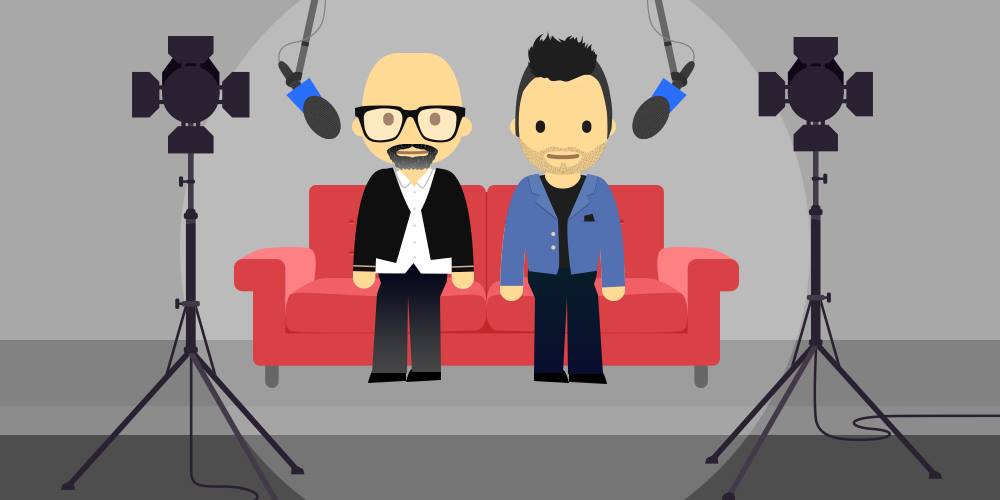
As a marketing consultant, you likely focus on social media, SEO and email campaigns. But do ever think about how to get local media coverage for clients, too?
While these are traditional marketing methods are great to develop your client's brand, and get them in front of their target audience, you shouldn’t dismiss the effectiveness of local news.
Hasn’t Traditional News Viewership Decreased?
To answer most simply, yes, people have stopped watching the news as often.
However, they are still getting their news from local news sources. They are just going about it differently today.

Traditional local news is becoming less relevant, but the eyeballs are still there if you take social media into account.
For example, many news anchors have their own social media channels with tons of traffic and a large following.
So, although it looks different today than in years past, through the use of search engines, mobile applications and social media, individuals still look to their local news outlets for their news.
James H. Mahon, a reporter for WDEF News 12 in Tennessee, explains this shift in traditional viewership below:
Local news, despite dwindling viewers, has a huge catchment area.
The reach of local news through social media is growing.
With the use of live streaming, Periscope, Twitter and Facebook audience reach is actually bigger than ever before.
Also, local news is still traditionally considered a trustworthy source.
Plus, reporters and anchors can be reached quickly through their Twitter and Facebook accounts, making them more accessible than before.
6 Tips to Get Local Media Coverage For Clients
You probably would love to get local media coverage for clients, but what's the best way? The following 6 tips will help you get moving:
1. Contact Reporters Via Social Media
Reach out to local reporters via their social media accounts. A great place to start is Muckrack's Media Outlet Dirtectory.
They have a massive list of journalists, their beat, social media accounts and more.
Go here, and type in your city in the search box like I did below:
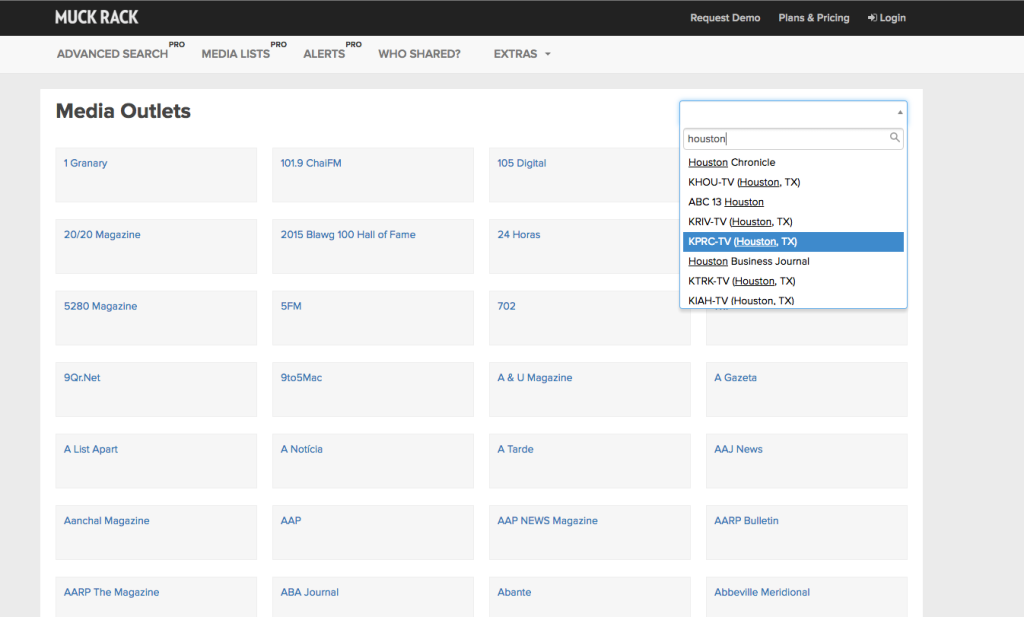
Select the TV station you want to target, and you'll get a set of results like this:
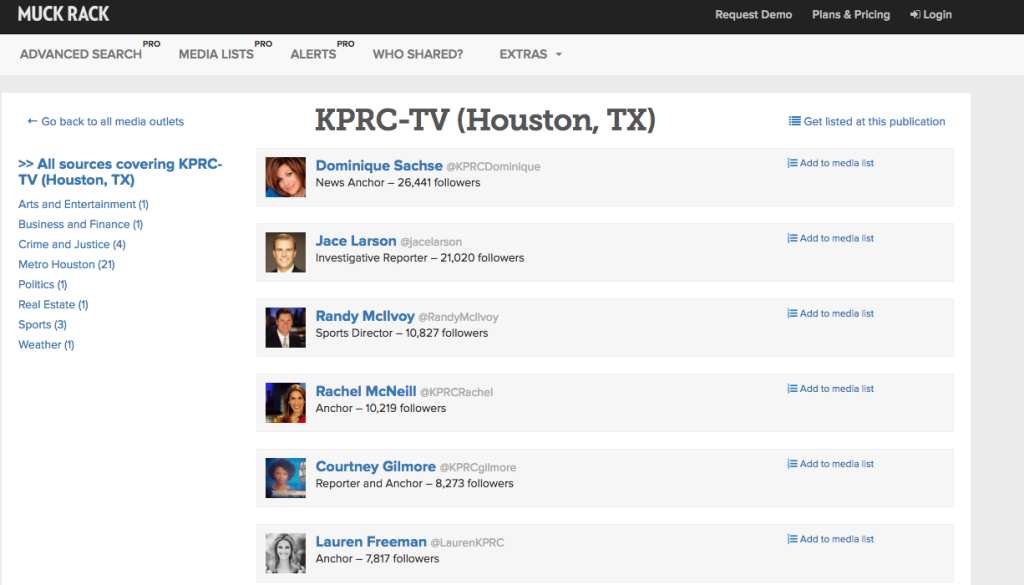
Then, you can look through the list, and get the social media account info for the journalist you want to contact.
This is crucial, because you want to make certain you are contacting the right reporter for your client.
In other words, don’t contact a sports reporter to do a piece on a local hair salon.
With one exception…the morning traffic reporter for KPRC in Houston.
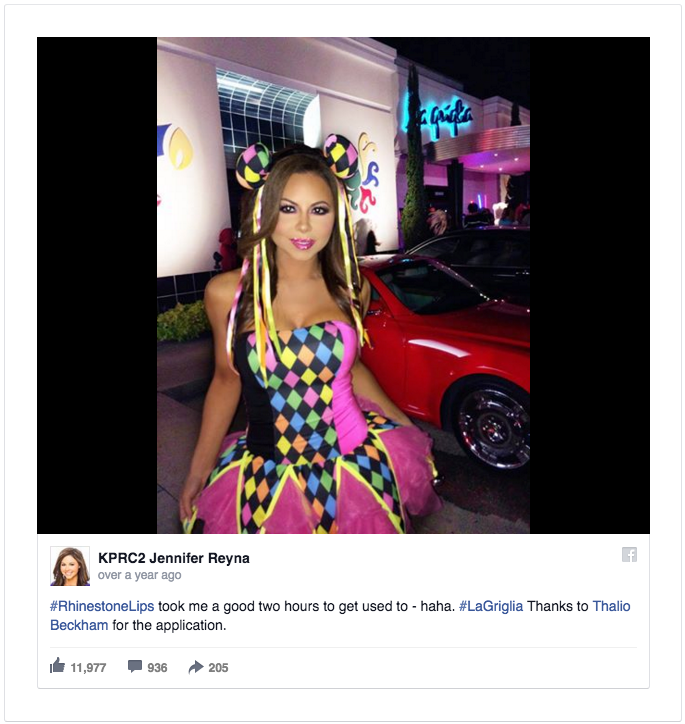
This rule does not apply to Jennifer Renya.
Even though she is the morning traffic reporter, I will reach out to her for all stories first. 🙂
In all seriousness though…
Be very careful…following proper etiquette is critical for success.
Interacting With Reporters The Right Way
Find the reporters you’re targeting—The first thing you need to do is add reporters to your network on Facebook. A lot of times, reporters will include a link to their Facebook profile at the end of their stories or somewhere on their bios.
Share their stories—Reporters are always thankful when people share their stories and help drive traffic to them. You can also leave nice comments on their wall whenever they write a story you enjoy.
Pay attention to what they share and post—By analyzing the type of content a reporter shares and posts, you can learn more about his or her interests so you can tailor your own stories to be more attractive to that specific reporter.
Be ready to jump on opportunities— You need to make sure you’re ready to pounce on any relevant opportunities that might arise when a reporter is looking for a source and your client is qualified.
Don’t spam them— You shouldn’t constantly be harassing reporters over Facebook, and you certainly don’t want to send them pitches irrelevant to their niche. You’ll quickly turn into a pest in their eyes.
Facebook is crawling with reporters, editors, bloggers, and other members of the media.
These people often use Facebook as a way to find sources, generate story ideas, connect with the communities involved with stories, share their stories, and so on.
Just be professional…and not a pest.
2. Don’t Forget About Mailing Lists
According to a famous postman, “the mail never stops”.
But in this case we're talking about your marketing list. 🙂
We spoke above about the benefits if you can get local media coverage for clients. Even more so than using a typical mailing list.
However, imagine if you could use both?
If you manage to get a reporter to post a story on YouTube or on the local news channel, ask them to include your story in their emails and/or newsletters.
Sometimes, due to certain policies, this isn’t doable.
But, it never hurts to ask. The worst thing they can say is no.
3. Live Remote Broadcasts
Get the local radio stations involved to build credibility.
According to Colonial Tin Works’ marketing experts, this is very effective; just “tie the broadcast in with a special event, contest or free offer.”
This added exposure will entice local TV stations to cover it.
The DJs can promote your event on air, and what’s more, they can really make it a lot more fun for everybody.
How To Pitch A Radio Station
Know the segments – Do some research into the radio programs your target audience listens to and get to know more about it. Most radio stations have breakfast, morning, afternoon, and drive shows, so if your story is news related these segments are a good place to pitch to.
Who to pitch to – You need to find out who the best person is to pitch your story to, to ensure it will be considered. In most cases this will be the program producer rather than the host of the show as they are involved in planning the show’s content.
How to pitch – In most cases it’s better to pitch to a radio producer with a phone call rather than an email. Radio journalists tend to work at a very fast pace and your email may become lost.
4. Make Sure to Use Facebook
News channels and their reporters often have a large Facebook following. These accounts are also verified as part of their contract with their employer.
So, their Facebook pages are reputable and trusted.
So, if you can get them to link to your client’s story, you will benefit from their followers and their reputation.
Also, if an on-air video or YouTube video isn’t possible, reporters can add video directly to Facebook.
This gives you yet another option with regard to getting your client’s name on the local news in some fashion.
5. Have The Right Pitch
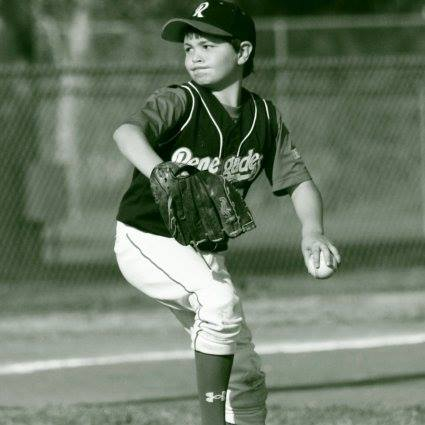
Jack's son, Max, is one of the top pitching prospects in the Houston area. This is an old picture…before he could beat Jack up.
You have to understand that reporters get hit up constantly with story ideas. 99% of them are horrible.
They are either uninteresting, or focused only on the benefit of the person pitching the idea.
You can't go in with a “we have a great deal going on this week…come do a story on it.”
The hook of the pitch has to be interesting and have a public interest angle.
6. Use Combined Promotions
It’s great to get a journalist to write up a story or have a reporter do an on-location video about your client. But, your work doesn’t stop there.
You must still promote the content.
The best way to do this is to ask the news channel what they plan to do regarding promotion. Then, you can offer more promotions that use the news content along with other types of marketing strategies.
And don't stop promoting it. Remember…There is no expiration date on PR.
Add to your welcome sequence for new subscribers, and post the link a few times a year on your social media accounts.
Don’t underestimate the ongoing benefits if you can get local media coverage for clients. Your local news channel is a powerful resources when it comes to marketing.
Although the family sitting together around the 5:00 news is a somewhat antiquated notion, the local news broadcasting station still provides a way for you to market.
You just have to go about it differently than you did just a few years ago.

